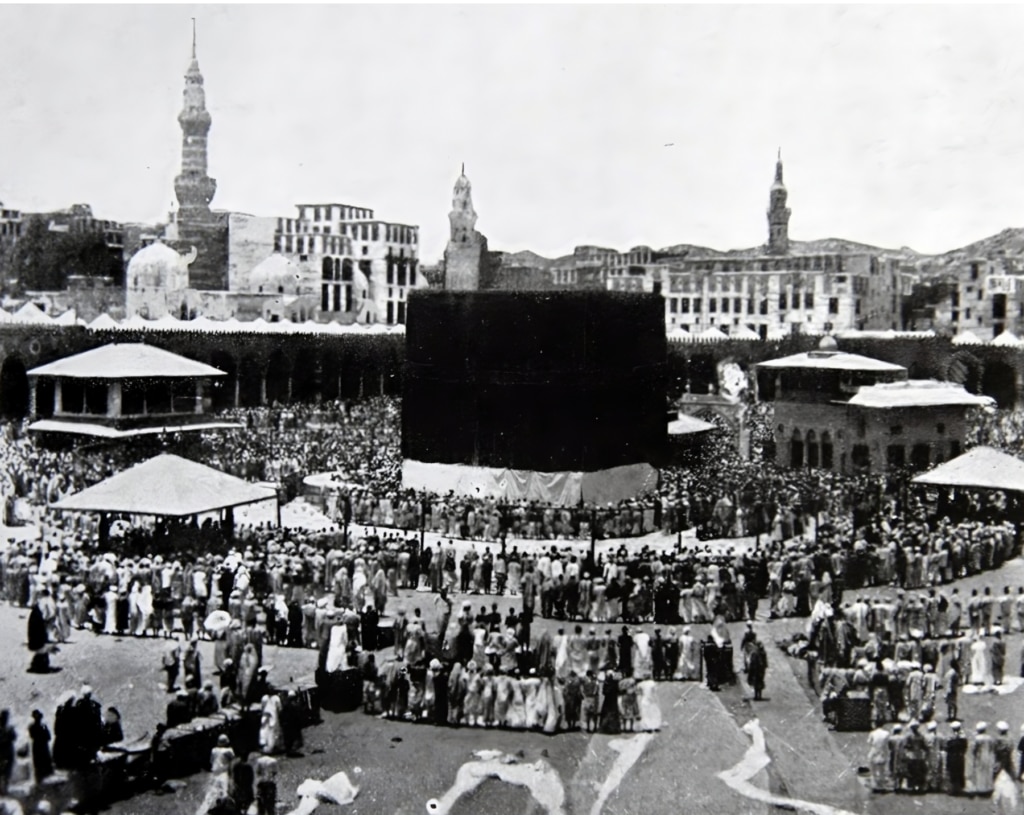Guidance regarding basic Islamic issues that Hazrat Amirul Momineen, Khalifatul Masih Vaa, has given on various occasions in his written correspondence and during MTA programmes is being published officially below for everyone’s benefit.
Is it permissible to hold two Jumu‘ah services in one place?

Someone asked Hazrat Amirul Momineen, Khalifatul Masih Vaa, “Can two Friday services be held at one location? If we are on security duty during the usual time of Friday prayer, can we perform another Friday prayer after our duty ends? Moreover, what should we do during Friday prayer at the Kaaba? Should we follow the non-Ahmadi imam and then perform our own Jumu‘ah later?”
Huzoor-e-Anwaraa, in his letter dated 11 January 2023, provided the following answer to this question:
“As far as the question of offering two separate Jumu‘ah prayers in one mosque [by two groups of people] under compelling circumstances is concerned, remember that just as the repeating of other congregational prayers is confirmed by ahadith of the Holy Prophetsa (Sunan at-Tirmidhi, Kitab as-salah, Bab ma ja’a fil l-jama‘ati fi masjidin qad sulliya fihi marrah) and also by the permission granted by the Promised Messiahas for it on account of some necessity (Badr, Qadian, Vol. 6, No. 1, 10 January 1907, p. 18), Friday services may also be held twice if necessary, and there is no objection to this.
“However, it is necessary to take precautions to ensure that the Friday prayer is not offered again in the same spot in the mosque where it was already performed. Instead, the on-duty khuddam should deliver their separate sermon and offer their Friday prayer in a different spot. An example of this can be found during the blessed era of Hazrat Khalifatul Masih Ira; Al Fazl (Qadian) recorded this in a column titled ‘Madinatul Masih’ as follows:
“‘On Fridays, men and women used to go to Aqsa Mosque. This also provided an opportunity for some mischievous people to cause trouble, which resulted in financial loss for a couple of individuals. Therefore, the following recommendation of Dr Khalifa Rashiduddin Sahib[ra] was accepted by Hazrat Maulvi Sahib (Khalifatul Masih Ira): He suggested that to achieve peace of mind, a group of believers should hold a vigil from noon until the Friday prayer has been offered, and then these sincere Ahmadis should observe their separate Friday prayer at Mubarak Mosque. Therefore, on that Friday, Babu Wazir Muhammad Sahib, a sincere and enthusiastic Ahmadi from Lahore, along with some twenty to thirty Ahmadi boys, some Afghan Ahmadis and Munshi Akbar Shah Khan Sahib, held the vigil. Then, Khan Sahib led the separate Jumu‘ah prayer, as was instructed by Amir(-ul-Momineen, Hazrat Khalifatul Masih Ira), after the people had returned from the Aqsa Mosque.’ (Al Fazl, Qadian, Vol. 1, No. 4, 9 July 1913, p. 1)
“Thus, while it is possible to hold another Friday service after one has already been held, it should be noted that such a situation should only arise out of necessity or compulsion, as confirmed by the above reference. Additionally, obtaining permission from the local administration is also a necessary step for this. Furthermore, [according to this particular reference], it is necessary not to offer the Friday prayer again in the same mosque where it has previously been offered, but rather to find a different location. If another location is not feasible, then the second Friday prayer may be held in the courtyard of the same mosque, behind its prayer niche [mihrab], or in a corner of that mosque.
“Regarding the performance of congregational prayers or Friday prayers at the Kaaba during Hajj or Umrah, the stance of the Ahmadiyya Muslim Jamaat is that the daily prayers or Friday prayers should not be performed behind a non-Ahmadi imam. Instead, if possible, Ahmadis should arrange their own congregational prayers. However, if this is not feasible, they should perform their individual prayers separately. If a situation arises where it becomes absolutely necessary to pray behind a non-Ahmadi imam, and there is no alternative without risking causing fitna or facing a trial for not participating, then prayers can be performed there to avoid strife. However, these prayers should also be performed separately afterwards. In this context, Hazrat Musleh-e-Maudra once shared the following incident regarding such a scenario:
“In the year 1912, I went on a pilgrimage to Mecca in company with Sayyid Abdul Muhyi Arab, visiting Egypt on our way. My maternal grandfather, Mir Nasir Nawab Sahib[ra], also went on a pilgrimage the same year. He went to Mecca directly from Qadian. We met at Jaddah, and from there journeyed together to Mecca. On the very first day at Mecca, while we were circumambulating the Kaaba, the time came for the evening prayers. I wished to withdraw, but our way was barred and the service had already commenced. Mir Nasir Nawab Sahib[ra] told me that Hadrat Khalifatul Masihra had ordered that, while at Mecca, we might pray behind non-Ahmadi Imams. Upon this, I joined the service. Later on, when we were still in the precincts of the Kaaba, came the time for the night prayers, and we joined as before. When we returned to our residence, I said turning to Sayyid Abdul Muhyi Arab, ‘The prayers we offered were only to comply with the command of Hadrat Khalifatul Masihra, let us now offer our prayers for the sake of Allah. Such prayers cannot rightly be offered behind non-Ahmadi Imams.’ We then repeated both the services. The next day, I believe, we joined another service behind a non-Ahmadi Imam. But I began to feel that although we subsequently repeated the service, a certain weight was oppressing my mind, and I felt that if I continued like that, I should certainly fall ill. At last, on the second day, I was compelled to speak on the subject to Sayyid Abdul Muhyi Arab. I said. ‘My regard for my grandfather prevents me from putting the question to him, but will you kindly enquire of him whether Hadrat Khalifatul Masih’s[ra] orders in this matter were given to him directly or was it that he learnt of them from a common report.’ Upon inquiry, it transpired that there were no direct orders but that my grandfather had heard that some such orders had been given to some person. I thanked God for the news and from that time, in spite of objections from various quarters, we always offered our prayers in our own congregation. We were in Mecca for about 20 days. At all times we offered our prayers either in our own house or in the Kaaba in a congregation of our own. And it was a special favour of God that although, as a general rule, none save the few recognised sects were allowed to form a congregation within the quadrangle of the Kaaba, no one objected to our congregation; and it often happened that many latecomers joined us in our prayers and swelled our congregation to a considerable size. My grandfather felt apprehension lest his part in the matter might in future, prove a source of trouble. He, therefore, said that he would bring the question to the notice of Hadrat Khalifatul Masihra on his return to Qadian. When at last we returned, our friends one after another invited us to functions arranged to welcome us. Among others, Miyań Hamid Ali an old servant of the Promised Messiahas, who had attended upon him for 40 years, invited us to tea. The guests included Hadrat Khalifatul Masihra, Mir Nasir Nawab Sahib[ra], Sayyid Abdul Muhyi Arab and myself. One gentleman, Hakim Muhammad Umar, put the question to Hadrat Khalifatul Masihra. The latter replied that he had never given any fatwa of that kind, that his permission was given only to such people as were weak and timorous. Such people, if they found themselves begird, by non-Ahmadis, might perform their prayers behind non-Ahmadis, and repeat their prayers when they returned to their places. Thanks to God that my action thus accorded both with the fatwa of the Promised Messiahas and with the views of the Khalifa of the day.’” (Ainah-e-Sadaqat, Anwar-ul-Ulum, Vol. 6, pp. 155-156 [as quoted in Truth About the Split (2007), pp. 157-160])
Is surrogacy allowed in Islam?

Someone sent a letter to Hazrat Amirul Momineen, Khalifatul Masih Vaa, asking, “Does the Ahmadiyya Muslim Jamaat permit surrogacy, and what is the status of surrogate mothers?” […]
Huzoor-e-Anwaraa, in his letter dated 16 January 2023, provided the following answer to this question:
“In surrogacy, the biological material from a husband and wife is developed within the womb of a woman who bears no lawful physical connection to this matter. Consequently, this practice is categorised under acts of indecency in light of Islamic teachings and is considered both illicit and sinful. Hazrat Khalifatul Masih IVrh also elucidated this matter in response to a query. He said:
“‘Dismiss from your heart the idea that if a woman is infertile or a husband lacks the capacity to sire a child, then our endeavours through artificial means are inherently sinful. This is not a sin; rather, it represents a method to attain the favour of Allah. And should He decree otherwise, no amount of human effort can yield a child not destined to be born. Here [in the UK], I have observed several Ahmadi women who, with my permission, endeavoured to conceive via in vitro fertilisation. Despite repeated attempts—once, twice, even up to ten times—no success was forthcoming. The innate defensive mechanisms that preclude conception continued to prevail, and no medical prognosis proved accurate. On the other hand, there was one young woman who sought my permission [for medical treatment]; I advised her to pray and see what transpires. Subsequently, she appeared with two delightful children in her arms. Thus, such blessings can only be conferred by the will of Allah the Almighty. Nevertheless, assisting in the schemes devised by God does not amount to opposing His works nor does it constitute a sin.
“‘One aspect is indeed sinful, which I will explain: In their pursuit of methods other than natural conception, some individuals, out of ignorance, try to get a child through a surrogate mother. This, in particular, is sinful. Just yesterday, I received a letter from a new Ahmadi in America expressing considerable anguish and seeking forgiveness. They said, ‘Before I embraced Ahmadiyyat, I was unaware of these issues. Since my wife was infertile, I inadvertently engaged in an act where, with the help of doctors, I had another woman bear my child, and now the child is with us.’
“‘Therefore, this method is unlawful as it contravenes the sacred laws of marriage and nikah established by Allah the Exalted. It represents a challenge to the system He has ordained for procreation. It is akin to forming a relationship with another woman without the bonds of marriage, or nikah, and then lauding the resultant child as virtuous. The child will invariably remain innocent, but the one who engages in such acts incurs sin. Hence, I counsel you that venturing into this particular domain constitutes sin. However, when legitimate efforts involve the gametes of both husband and wife, and assistance in conception is sought through their mutual relationship, it is not only permissible but also fitting, and in no way sinful.’ (“Urdu Mulaqat” with Hazrat Khalifatul Masih IVrh, 29 April 1994)
“Thus, according to the Ahmadiyya Muslim Jamaat, surrogacy is fundamentally at odds with Islamic teachings and is an illegitimate method. Consequently, surrogate mothers do not possess any lawful status in Islam from an Islamic standpoint.” […]
(Compiled by Zaheer Ahmad Khan, Head of Records Department, Private Secretariat, London. Translated by Al Hakam.)

